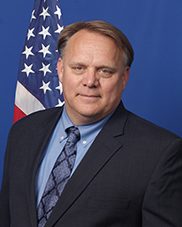
Commercial UAV Expo is hosting a record-breaking crowd in Las Vegas this year. At the first keynotes of the show this morning, a lineup of important industry figures gave attendees the insights they’ve been waiting for – including the FAA plan for drone regulation in the coming year.
Continue reading below, or listen:
Lisa Ellman, Executive Director of the Commercial Drone Alliance, explained that the CDA is working to encourage the administration of the US to make it a government-wide policy to support U.S. leadership and competitiveness in the commercial drone industry. In a fireside chat with David H. Boulter, FAA Acting Associate Administrator for Aviation Safety, Ellman asked Boulter to discuss how the FAA was working with the drone industry to move regulation forward.

“It’s a big push for [us] that we meet these deadlines… we can have safety, and deliver on deadlines,” said Boulter.
The FAA Plan for Drone Regulations and Integration: Creating Paths
Boulter explained that conceptually, the FAA is working to determine a clear path to advanced commercial operations. “As a team in FAA, we are really leaning into this space,” he says. “The path of exemptions is not a long-term path.”
Regulation doesn’t happen suddenly. “You get there step by step. I’d like to see us take smaller, more frequent steps,.. and create those paths,” says Boulter. “…Reliability is not just a machine thing. It’s setting up regulations that work.”
Ellman asked Boulter what the agency was doing right now to speed up the process of issuing exemptions for advanced operations.
“In terms of exemptions,…we’re trying to template a lot of this,” Boulter answered. “If we can capture the vast majority of the community in a series of exemption templates, we can grant those a lot faster. That’s not a long term strategy, it’s a ‘get you here today’ strategy.”
“In the long term… we need to make rules. The important part for us is that we need to make performance-based rules… we do really want to get to the place where the administrator can authorize, rather than go through a rule-making process hundreds of time a year.”
Matternet Scores First Type Certification
Type certification has been a long process, that many manufacturers are struggling through in order to scale their operations. In a surprising announcement, Boulter revealed that drone delivery company Matternet had today received the nation’s first standard type certificate. “Matternet is going to get their standard type certificate for their drone,” he said. “That’s the first one…. and this means a lot. There is a path that has been built. Hopefully that path gets better and better and more and more efficient.” (Read more about the Matternet Type Certification here.)
Remote ID Implementation
As the September 16, 2022 deadline for manufacturers to implement Remote ID solutions on their drones looms, many manufacturers have expressed concern about the late delivery of specific information. While some manufacturers have a solution – Skydio announced their plans to comply with Remote ID to customers today – others aren’t there yet. Boulter says that rather than move the deadline, the agency is going to take a collaborative approach with manufacturers who are in the development process. “We’re going to use ‘Enforcement Discretion,’ on the September date,” said Boulter. “We’re going to work with manufacturers – we’re going to keep making progress together. ”
Boulter’s closing message to the audience was one of willingness to collaborate with the drone industry. “Work with us,” “Reach out to us, participate… give feedback. We’ll do what we can. We’ll respond – it won’t always be yes, but we’ll respond. As public service, we owe you that.”
“At the end of the day… we need to be safe and efficient. We can do both,” said Boulter.
Read more about the FAA and Drone Regulations:
- American Robotics FAA Exemption: Scout System May Operate Without Limits
- Is FAAs Remote ID Rule for Drones Constitutional? The Court Ruling
- FAA Grants Approval for Flytrex to Double Drone Delivery Range
- New FAA Administrator: Biden Taps Airport Executive Phil Washington
- DL Exclusive: Commercial Drone Alliance on BVLOS ARC Report and Why BVLOS Flight is Critical for the Industry
Miriam McNabb is the Editor-in-Chief of DRONELIFE and CEO of JobForDrones, a professional drone services marketplace, and a fascinated observer of the emerging drone industry and the regulatory environment for drones. Miriam has penned over 3,000 articles focused on the commercial drone space and is an international speaker and recognized figure in the industry. Miriam has a degree from the University of Chicago and over 20 years of experience in high tech sales and marketing for new technologies.
For drone industry consulting or writing, Email Miriam.
TWITTER:@spaldingbarker
Subscribe to DroneLife here.